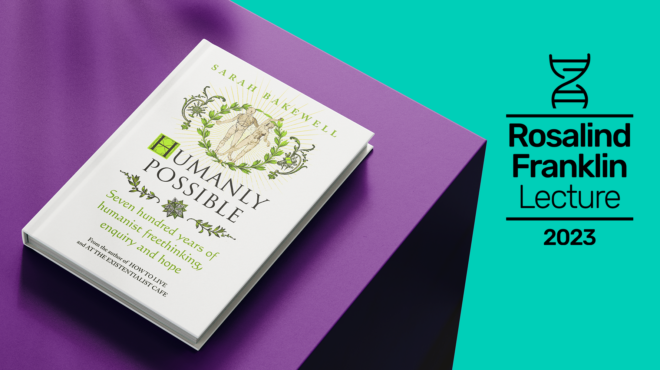Humanists UK presents:
The Rosalind Franklin Lecture
Humanly Possible: 700 Years of Humanist Freethinking, Enquiry, and Hope
8th March 2023 · 7:30pm - 9:00pm
Doors open: 7:00pm
In person | Virtual event

If you are reading this, it’s likely you already have some affinity with humanism, even if you don’t think of yourself in those terms. You may be drawn to literature and the humanities. You may prefer to base your moral choices on fellow-feeling and responsibility to others rather than on religious commandments. Or you may simply believe that individual lives are more important than grand political visions or dogmas.
If any of these apply, you are part of a long tradition of humanist thought, and you share that tradition with many extraordinary individuals through history who have put rational enquiry, cultural richness, freedom of thought and a sense of hope at the heart of their lives.
In this 2023 Rosalind Franklin Lecture, Sarah Bakewell will introduce us to some of these people, as she asks what humanism is and why it has flourished for so long, despite opposition from fanatics, mystics, and tyrants. Her upcoming book, Humanly Possible, is a treasure trove of ideas, personalities, and real-life examples of humanism in action – from the literary enthusiasts of the 14th century to the contemporary secular campaigners. From Christine de Pizan to Bertrand Russell, and from Voltaire to Zora Neale Hurston, Sarah will showcase the history, diversity, and continuity of humanist thinking.
She will delve into the rich history of humanism by examining the works of writers, thinkers, scientists, and artists spanning 700 years – with a particular focus, in her lecture, on humanist women. In her Rosalind Franklin Lecture, Sarah will uncover their contributions to the ongoing pursuit of understanding what it means to be human. She will take us on an irresistible journey, and joyfully celebrate open-mindedness, optimism, freedom and the power of the here and now: humanist values which have helped steer us through dark times in the past, and which are just as urgently needed in our world today.